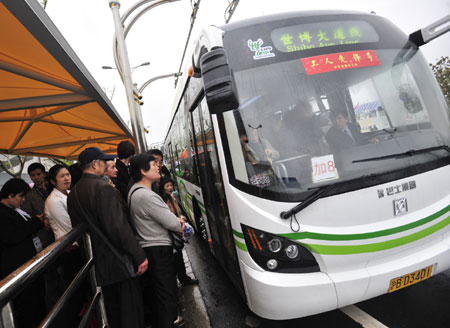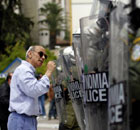Cars
Public transport to help fuel spread of charging network
By Liu Yiyu (China Daily)
Updated: 2010-05-13 09:46
 |
Large Medium Small |
|
 |
|
An electric bus deployed at the ongoing Shanghai World Expo. China has doubled the number of pilot cities for green vehicles to 20 this year. [Shepherd C. Zhou / China Daily] |
Beijing - Public transport is expected to lead the green vehicle race as more automakers and cities boost their electric vehicle and charging station network plans, experts said.
"Electric buses have fixed routes and therefore it's easier to recharge the batteries," said Xu Changming, research director with the State Information Center.
A major problem that has affected the takeoff of electric vehicles is the long charging time for batteries. It takes two to eight hours to recharge the batteries of electric vehicles, industry experts said.
China is likely to come out with a subsidy policy for household purchases of electric cars later this month. That in turn, is expected to encourage sales of electric cars.
But the policy is also controversial as it uses the money collected from all taxpayers to subsidize electric car buyers, usually middle-class people.
"Public transportation is part of the social welfare system and thus it's less controversial to subsidize the sector," said Xu.
Beijing has 50 electric buses in operation at present and plans to add 250 more buses this year.
"The existing electric buses use the battery swap system whereby a dead battery can be replaced within 8 minutes at our exchange station," said Zhang Jianping, president of Beijing e-bus Technology.
An electric bus can run 80 kilometers after each charging which takes four hours. The buses usually charge the batteries twice a day.
Zhang's company is the charging system provider for all the 50 electric buses used during the 2008 Beijing Olympic Games. After the Olympics, the buses were used for public transportation.
The company is also the operator of the battery swap system for the 120 electric buses deployed at the ongoing Shanghai World Expo.
But most of the electric buses are still in pilot stages. An exchangeable battery costs 50,000 yuan ($7,321), according to Zhang, while electric buses cost twice as much as a normal bus.
To encourage the use of green vehicles, Beijing is offering subsidies of 800,000 yuan to 1 million yuan for electric bus buys.
"Electric buses are the trend in public transportation and the market will be huge in the next five years," Zhang said.
China has doubled the number of pilot cities for green vehicles to 20 this year and each city is required to have at least 1,000 new energy vehicles.
Shanghai has set a goal of 400 more roadside charging points and seven to 10 large charging stations by the end of this year, for electric buses, according to the local government.
The city built the first charging station for electric cars last October, but uses it mainly for demonstration purpose.















